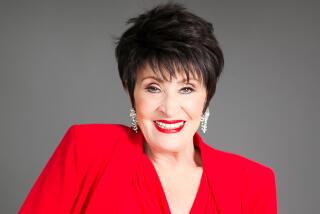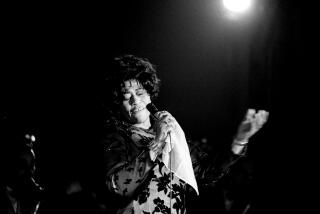Stilled voices: sardonic, sexy
- Share via
Even as a pre-adolescent growing up in subarctic Rochester, N.Y., watching Eartha Kitt’s Catwoman taunt Adam West’s Batman always made me feel a little, um, hot. Julie Newmar, Emma Peel and the rest of the leather-jumpsuited superwomen/femmes fatales of the ‘60s were fine too. But for my inchoate tastes in all things feminine, Kitt was the insouciant queen.
Of course, most of the campy insinuations that passed between Kitt’s feline predator and the Caped Crusader went clean over my close-cropped head. Likewise, I was too unpolished to know that Kitt’s velvety, supple voice sounded even better when it was crooning “Love for Sale” or some other classic of the louche cabaret life.
It’s been noted that phrases like “seductive purr” were catnip to male critics when describing Kitt’s stage persona. And indeed, her voice does seem to snuggle up next to you, simultaneously playful, warm and glorying in sensual self-satisfaction. But there was much more to Kitt, who died on Christmas Day at 81, than this campy, sex-kitten caricature.
For starters, she was a pioneer among African American entertainers. Years before Oprah, Kitt was a complete package, a multimedia threat. She started her long career as a dancer with Katherine Dunham’s troupe and eventually showered her considerable talents on stage, big and small screen and in upscale cantinas like the Cafe Carlyle.
Like Lena Horne, Sidney Poitier (with whom she appeared in the film “The Mark of the Hawk”) and Sammy Davis Jr. (her co-performer in “Anna Lucasta”), Kitt helped to nudge Hollywood’s color barrier several feet from the dominant crude stereotypes.
And like Chita Rivera and a few other nonwhite female performers of the early post-World War II era, Kitt showed that you didn’t have to be a Marilyn Monroe-style golden girl or a Rita Hayworth redhead to inflame the great Middle American libido.
Kitt naturally milked her popular, love goddess image for all it was worth. She titled her 1989 autobiography “I’m Still Here: Confessions of a Sex Kitten.” That was one of several memoirs produced by Kitt, who never could be accused of self-effacement.
But Kitt also had true grit. Born in South Carolina, she was the daughter of an absentee white father and a part Indian, part African American sharecropper mother. She worked in cotton fields and knew the burden of being what was then called a mixed-race child or, colloquially, a yella, i.e. “yellow,” gal.
She moved to Harlem, exchanging her turbulent domestic life for one enriched by the cultural vitality of New York’s African American mecca.
Her popularity suffered for a while because she refused to silence her conscience and she was investigated by the FBI after an encounter with Lady Bird Johnson, in which she expressed her opposition to the Vietnam War. She lived for years in Europe, but she had the satisfaction of being discovered late in life by a new generation of appreciative fans.
By chance, I spent Christmas Eve at an Olvera Street restaurant, where the entertainment included L.A.’s marionette master Bob Baker and his matchless puppets. One number had Baker pulling the strings of a larger-than-life-size pink female pussycat, purring out one of Kitt’s signature tunes, “Santa Baby.”
The kids loved it. The adults smiled. It was sexy and fun, naughty but nice.
Which is to say, it was pure Eartha Kitt.
--
More to Read
The biggest entertainment stories
Get our big stories about Hollywood, film, television, music, arts, culture and more right in your inbox as soon as they publish.
You may occasionally receive promotional content from the Los Angeles Times.











